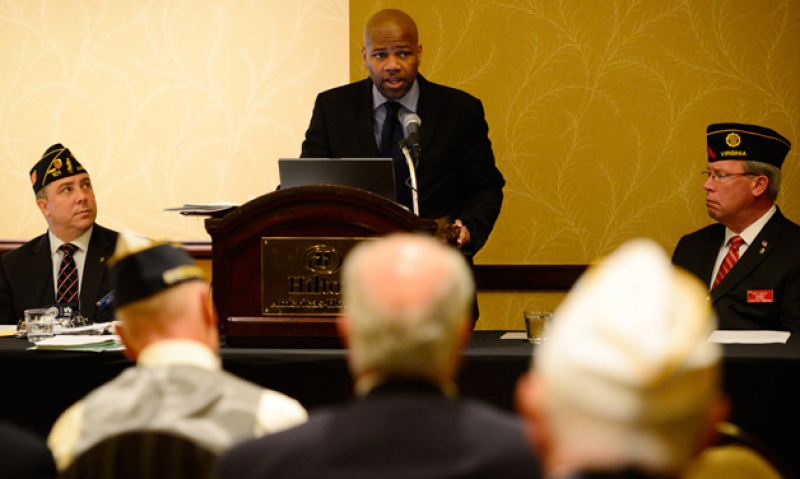
Heritage Foundation national security expert warns of "fourth hollow force" since World War II.
Saying that he has "enormous respect for The American Legion," James Carafano of The Heritage Foundation told the Legion's Legislative Commission at National Convention in Houston, "You're amazingly effective in Washington, D.C..... You are continuing to serve – your organization is doing wonderful things for this country."
Carafano, a national security expert, talked about "what keeps me up at night:" the prospect of the United States having its fourth "hollow force" since the end of World War II. His father, a Korean War veteran, experienced firsthand the reality of fighting a war that America's armed forces were not well prepared to fight.
While America still retains the ability to defend itself from enemy attack, Carafano explained that a "hollow force" would inhibit the Armed Forces' ability to intervene in smaller conflicts that could spin out of control into a possible World War III.
Describing the overwhelming odds U.S. troops faced when Chinese forces surged across North Korea's border in October 1950, Carafano told an anecdote about a young lieutenant fresh from the States and a crusty platoon sergeant who had fought in World War II. Watching a mass of Chinese soldiers heading toward their position, the lieutenant asked, "What do we do, sergeant?" The sergeant replied, "I don't know what you're going to do, but I'm going to run."
America hollowed out its military forces a second time after the Vietnam War, Carafano said, about the same time the switch was made to an all-volunteer force. "(President) Reagan fixed that," but by the 1990s, "we were drifting back to a hollow force after the Cold War." Although America is still a global power, Carafano said, it made massive cuts to its armed forces in the 1990s and keeps delaying modernization programs. So when 9/11 hit, America "really was not prepared for about a year" to fight a major war.
Now, with the Iraq War's end and the drawdown in Afghanistan, Carafano fears the country will see its fourth "hollow force" since the end of World War II. Much of the military's equipment is at least 20 years old, and the demand for modernizing the Armed Forces is much greater than it was in the 1990s.
A 25-year Army veteran, Carafano said that wihile stationed at Fort Sill, Okla., he actually replaced a broken tank tread with a piece from an armored vehicle in the fort's museum. Otherwise, he said, it would have taken two years to get it through the Army supply chain.
Even if the sequestration problem didn't exist, Carafano said, "our military would still go hollow" because of defense cuts already made. Department of Defense (DoD) funding over the past decade has gone to fight two wars, not to upgrade or refurbish military equipment. Yet, military spending isn't the major problem facing the U.S. budget – entitlement spending is the real culprit, according to Carafano.
We could zero out DoD spending today," he said, "and in 20 years all federal dollars would be going to entitlements. Congress is trying to balance the budget on the back of the military." Washington really has no answer to this overarching dilemma and both Republicans and Democrats "are willing to live with the sequester."
What can The American Legion do to help America avoid another "hollow force" when military threats lurk in corners across the planet: Russia, China, the Middle East, al-Qaeda, North Korea. Carafano said the Legion can help document the loss in America's military capabilities. He underscored the importance of what one organization can actually do in advocating for a strong national defense by bringing up the Battle of Gettysburg as an analogy.
On the first day of the battle (July 1, 1863), the fate of the Union Army depended on holding its position at Little Round Top – held by the 20th Maine Regiment. It was the last man in line's duty to stop any Confederate soldiers from turning the flank of the Union line. "On that day, that soldier was the hope of democracy," Carafano said. "If we don't stand on these issues, then who will?"
The Legion's Legislative Commission was also addressed by Kevin Dancy, from the office of Rep. Al Green, D-Texas. He reminded the commission of Green's efforts to help the Department of Veterans Affairs reduced its disability claims backlog, and mentioned several bills related to veterans issues that Green had introduced in the U.S. House of Representatives: the Homes for Heroes Act (which passed the House last May), the Housing Assistance for Veterans Act, the Transportation for Heroes Act, and the Homeless Veterans Burial Act.
Legislative director Louis Celli encouraged commission members to remind their congressional representatives about the number of American Legion posts in their districts, and the number of voters their memberships represented. He said Congress pays attention to three things – money, jobs or votes – "and we can bring them votes," he said. "When we sit down with them eyeball to eyeball, we get a lot of attention.
Celli also explained that American Legion Assistant Director Jeff Steele has been reorganizing the Legion's Legislative Council over the past few months to make it a more powerful advocacy tool. "This reorganization is just going to strengthen the power of The American Legion," Celli said.
- Legislative

